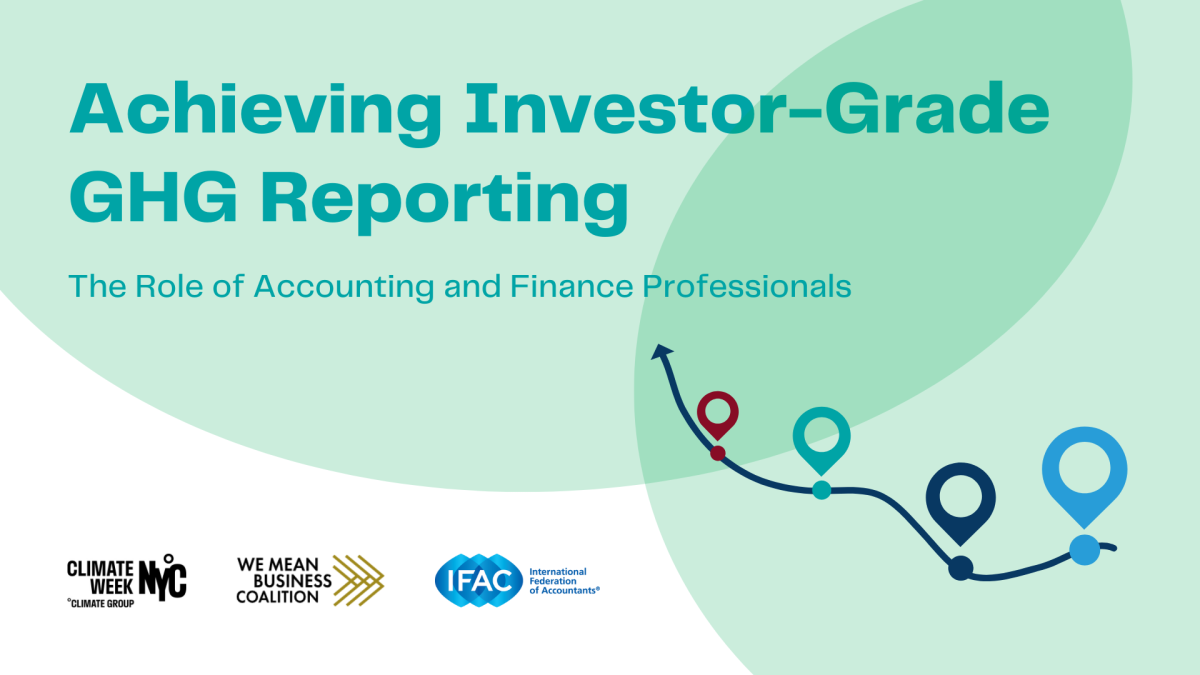The Role of Accounting and Finance Professionals
Date:

In response to climate change’s escalating impacts and disclosure requirements, IFAC and WMBC present Achieving Investor-Grade GHG Reporting: The Role of Accounting and Finance Professionals to explore their role in aligning GHG emissions accounting with financial reporting to deliver decision-useful GHG reporting.
This discussion will build on the guidance recently issued by the International Federation of Accountants (IFAC) and the We Mean Business Coalition (WMBC) in partnership with Accounting for Sustainability (A4S), Global Accounting Alliance (GAA) and World Business Council for Sustainable Development (WBCSD) designed to empower CFOs, accounting and finance professionals to deliver robust GHG reporting. The first part of the guidance, 8 Steps to Enhance GHG Reporting: A Roadmap for Accounting and Finance Professionals, provides finance and accounting professionals with a roadmap to engage with others across their business to prepare GHG emissions reporting requirements aligned to financial reporting processes and cycles. While the second, GHG Reporting Building Blocks for Accountants, equips accountants with the technical guidance necessary to collect and enhance the quality of data related to all scopes of GHG emissions at individual entity and group levels.
With their ideal positioning to champion an integrated mindset within organizations by connecting financial and emissions data and processes and analyses, accounting and finance professionals play a crucial role in providing decision-useful and trusted GHG reporting. By working effectively with others including sustainability professionals, and operations, finance teams can help ensure GHG emissions reporting is done in the most cost-effective way by establishing reporting structures, processes and systems that lead to material investor focused GHG disclosures. By connecting financial and sustainability reporting, they can deliver consistent and standardized entity-level and consolidated enterprise GHG emissions data, based on robust data collection and modelling, providing the foundation for setting GHG emissions reduction targets, KPIs and budgets, and developing decarbonization plans.
Join us to learn from a panel of experts about their experiences, challenges, and best practices in collaborating with sustainability professionals and others to improve GHG reporting that satisfies both organizational and investor needs. Integrating GHG emissions data into financial processes can boost reporting confidence, provide decision-useful information to investors consistent with financial reporting boundaries and consolidation, and streamline compliance costs for companies.
The panel discussion will be moderated by Stathis Gould, Director, IFAC and feature:
- Eugene Brink, Vice President, Finance Transformation, GE Vernova
- Jimmy Greer, ESG Specialist, Datamaran
- Mike Harris, ESG Services Leader at PwC Canada; Chair, Sustainability Assurance Committee, Auditing and Assurance Standards Board (AASB)
- Jane Thostrup Jagd, Director, Net Zero Finance, We Mean Business Coalition; Former Lead Compliance Officer at Maersk and Ørsted
- Elizabeth Seeger, Board Member, International Sustainability Standards Board (ISSB)
